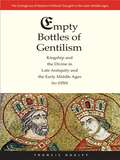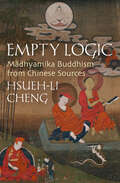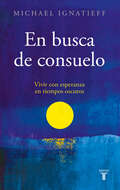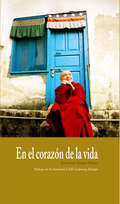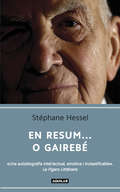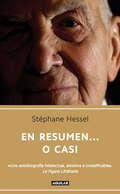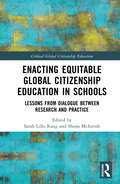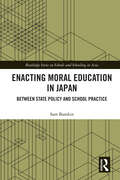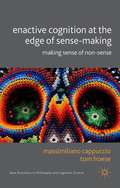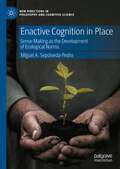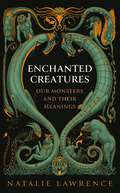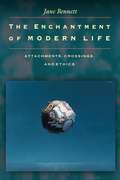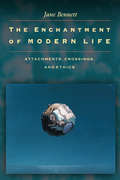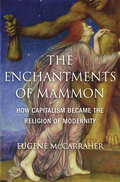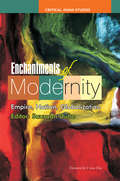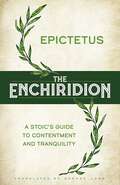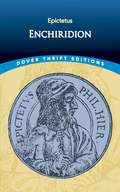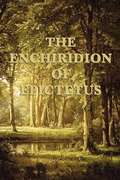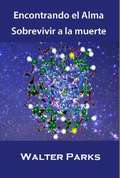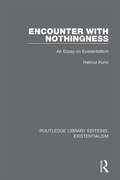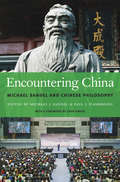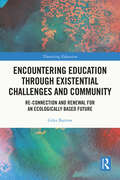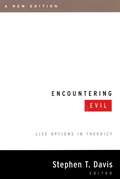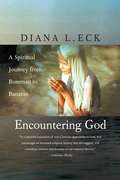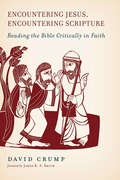- Table View
- List View
Empty Bottles of Gentilism
by Francis OakleyIn this book--the first volume in his groundbreaking trilogy on the emergence of western political thought--Francis Oakley explores the roots of secular political thinking by examining the political ideology and institutions of Hellenistic and late Roman antiquity and of the early European middle ages. By challenging the popular belief that the ancient Greek and Roman worlds provided the origins of our inherently secular politics, Oakley revises our understanding of the history of political theory in a fundamental and far-reaching manner that will reverberate for decades. This book lays the foundations for Oakley's next two volumes, which will develop his argument that it is in the Latin middle ages that we must seek the ideological roots of modern political secularism.
Empty Logic: Madhyamika Buddhism from Chinese Sources
by Hsueh-li Cheng&“Covers the basic philosophy and arguments of Mādhyamika, as well as discussing its possible influence on other forms of Buddhist thought, including Zen.&”—Journal of Chinese Philosophy The chief purpose of Empty Logic is to expound the Mādhyamika philosophy of emptiness as presented in Chinese sources and to clarify misconceptions about this important Buddhist ideology. It is an attempt to present the earlier Chinese San-lun exposition of Nāgārjuna&’s thought. To followers of Mādhyamika, the doctrine of emptiness is not a metaphysical theory; rather it is essentially a way of salvation. Few people know that one of the most significant outcomes of Nāgārjuna&’s teaching was the creation of Zen (Ch&’an) Buddhism in China. In this work, Hsueh-li Cheng provides a general background of Buddhism to give a historical perspective of Mādhyamika thought and development. After exploring the various meanings and use of emptiness in the process of salvation and illustrating the relationship between Mādhyamika and Zen, Cheng investigates how Mādhyamikas addresses the concepts of reality, God, and knowledge. There follows a brief comparison between Nāgārjuna&’s, Kant&’s, and Wittgenstein&’s philosophies to suggest the unique nature of Nāgārjuna&’s teaching and explain why his beliefs cannot be classified alongside the other two thinkers. Teaching emptiness as the middle way, the revolutionary Mādhyamika branch of Buddhism offers a singular and fascinating path to achieving liberation from the evil and suffering of the world.
En busca de consuelo: Vivir con esperanza en tiempos oscuros
by Michael IgnatieffUn libro luminoso y reconfortante sobre cómo los grandes filósofos y artistas recuperaron las ganas de vivir tras afrontar grandes crisis. Nos blinda contra el desaliento. «Ignatieff nosrecuerda que no somos la primera generación que se enfrenta a la desesperación y busca caminos para salir de ella». The Guardian Cuando la vida parece perder su sentido, necesitamos palabras. Cuando sufrimos un duelo, una traición, la soledad o una derrota, buscamos ayuda para recuperar ese sentido. El lenguaje del consuelo fue antaño el gran objeto de estudio de religiosos y filósofos, pero se ha ido desvaneciendo de nuestro vocabulario moderno. Desde el siglo XVI, la humanidad ha tendido a rechazar el alivio proveniente de los textos sagrados para, en su lugar, concentrar su fe en la ciencia, las ideologías y las terapias. Además, como advierte el gran pensador e historiador Michael Ignatieff, «hoy el premio de consolación es el que nadie quiere ganar. Las culturas que persiguen el éxito no prestan mucha atención al fracaso, la pérdida o la muerte. La consolación es para los perdedores». Ignatieff explora con brillantez y de forma conmovedora el modo en que una serie de filósofos, escritores, artistas y músicos como Dante Alighieri, Albert Camus, Anna Ajmátova, Gustav Mahler o Primo Levi recobraron la esperanza tras momentos de desamparo. A menudo encuentra las claves donde menos lo esperaríamos: en el fracaso del estoicismo de Cicerón, en las noches de insomnio de Marco Aurelio, en las ilusiones rotas de Karl y Jenny Marx, recreando las situaciones en que estas grandes figuras encontraron el coraje, la fortaleza, la fuerza intelectual y la imaginación necesarios para hacer frente a su destino. En busca de consuelo muestra lo que esas historias pueden enseñarnos a la hora de afrontar las angustias e incertidumbres del presente. La crítica ha dicho:«Seguir a Michael Ignatieff en su búsqueda de momentos de consuelo en la historia es iluminador, conmovedor y reconfortante, todo a la vez».Stephen Greenblatt, autor de El giro «La lectura de estos memorables retratos de figuras históricas que necesitaron, buscaron, perdieron el consuelo o lo encontraron deja al lector bien concienciado de los profundos retos y posibilidades que la vida nos plantea».Mark Lilla«Este ensayo erudito y sincero nos recuerda que la necesidad de consuelo es intemporal, como lo son las palabras inspiradoras y los ejemplos de quienes recorrieron el camino de la vida antes que nosotros».Toronto Star «Ignatieff rastrea lo que pueden enseñarnos los grandes pensadores sobre cómo aferrarse a la esperanza y seguir creyendo en la vida. Este libro importante defiende que lo que nos consuela no son las doctrinas, sino las personas».The Irish Times«Una inspiración para los que necesitan palabras para seguir con su vida».Kirkus Reviews «Imprescindible. Ignatieff quiere que los modernos conozcamos las viejas costumbres que hemos dejado atrás, y recordarnos que algunos problemas están, por su naturaleza, más allá de los poderes de la tecnología y del buen gobierno».Air Mail
En el corazón de la vida
by Pedro Pablo Menéndez Jetsunma Tenzin Palmo Zuanilda Mendoza Itzel García Patricio Ortiz Alejandro García Alberto Fournier Diana Luz Sánchez Lilian Sussman Raquel Cajiga Elisa Caño S.S Gyalwang Drukpa Leticia GómezJetsunma Tenzin Palmo nos ofrece en este libro una comprensión profunda del Dharma, obtenida a lo largo de cuarenta años de compromiso con la práctica budista. Su perspectiva es vasta, con un entendimiento bien cimentado de cómo las enseñanzas atemporales de Buda se aplican a las exigencias y retos de la vida contemporánea. En el corazón de la vida está dirigido al público en general y presenta consejos prácticos que pueden ser aplicados seamos o no budistas, a partir de reflexiones sobre cómo enriquecer nuestras vidas y desarrollar amor, compasión y sabiduría.
En resum ... o gairebé
by Stéphane Hessel«Una autobiografia intel·lectual, emotiva i inclassificable.» Le Figaro Littéraire «Aquesta acumulació de memòria humana constitueix un tresor de sentit. Haver travessat un segle ple d'invents, esperances i horrors, i haver viscut plenament aquesta aventura és el que em dóna legitimitat. Perquè potser he rebut de la vida un deute de sentit, i avui em puc permetre pagar-lo amb el meu testimoni.»Stéphane Hessel A En resum... o gairebé l'agitador de consciències Stéphane Hessel aborda de manera magistral els temes de la indignació i els seus límits, la compassió, l'amor, l'admiració, la resiliència, la reivindicació de la dignitat, la força de les paraules, el compromís polític o la democràcia per transmetre a les noves generacions que cal lluitar dia a dia per recuperar la dignitat i per construir les bases d'un futur comú més just i accessible per a tothom. Una obra reveladora i necessària en la qual la veu de Hessel es barreja amb versos i confidències, amb opinions i records que configuren la trajectòria intel·lectual i personal d'un home bo. Opinions:«Les paraules de Stéphane Hessel desborden el marc d'un simple llibre. Són una crida a obrir els ulls i despertar les nostres consciències. Aquest llibre, per tant, no és una autobiografia en sentit estricte, no mira cap al passat. És una invitació a tenir valor. Recull unes experiències que han resultat exemplars i útils per fer costat a un compromís, a una manera d'enfrontar-se a la vida.»Maren Sell (editor francès)
En resumen... o casi
by Stéphane HesselUn compendio de experiencias ejemplares para respaldar un compromiso, una manera de enfrentar la vida. «Esta acumulación de memoria humana constituye un tesoro de sentido. Haber atravesado un siglo lleno de inventos, esperanzas y horrores, y haber vivido plenamente esta aventura es lo que me da legitimidad. Porque tal vez he recibido de la vida una deuda de sentido, y hoy puedo permitirme pagarla con mi testimonio.»Stéphane Hessel En En resumen... o casi el agitador de conciencias Stéphane Hessel aborda de forma magistral los temas de la indignación y sus límites, la compasión, el amor, la admiración, la resiliencia, la reivindicación de la dignidad, la fuerza de las palabras, el compromiso político o la democracia para transmitir a las nuevas generaciones que es preciso luchar a diario por recuperar la dignidad y por construir las bases de un futuro común más justo y accesible para todos. Una obra reveladora y necesaria en la que la voz de Hessel se entremezcla con versos y confidencias, con opiniones y recuerdos que configuran la trayectoria intelectual y personal de un hombre bueno. Reseñas:«Una autobiografía intelectual, emotiva e inclasificable.»Le Figaro Litteraire «Las palabras de Stéphane Hessel desbordan el marco de un simple libro. Son una llamada a abrir los ojos y despertar nuestras conciencias. Este libro, por tanto, no es una autobiografía en sentido estricto, no mira hacia el pasado. Es una invitación a tener valor. Recoge unas experiencias que han resultado ejemplares y útiles para respaldar un compromiso, una manera de enfrentarse a la vida.»Maren Sell (editor francés)
Enacting Equitable Global Citizenship Education in Schools: Lessons from Dialogue between Research and Practice (Critical Global Citizenship Education)
by Sarah Lillo Kang Shona McIntoshOffering contributions and vignettes from teachers, school leaders, and scholars, this volume purposefully dismantles practitioner-academic divides to invite dialogue around diverse understandings of global citizenship education (GCE). Recognizing that the field of GCE is often explored and conceptualized by educators and academics in silos, this book confronts this issue by focusing on how schools, educators, and researchers can together support the enactment of GCE in international and national settings. In doing so, issues of westernization, inequality, access, and divergence between GCE policy and practical implementation can be overcome. The novel dialogical format links together theory, practice, and lived experience to create discourses between voices that are rarely connected. Ultimately, this volume offers important insights for those aiming to make equitable GCE a reality in schools worldwide and illustrates the value of collaborative dialogic exchange. This text will benefit scholars, academics, and students in the fields of international and comparative education, the sociology of education, and citizenship more broadly. Those involved with multicultural education policy and citizenship in the context of political sociology and social policy will also benefit from this volume.
Enacting Moral Education in Japan: Between State Policy and School Practice (Routledge Series on Schools and Schooling in Asia)
by Sam BamkinDrawing on the case of moral education reform, this book provides an authoritative picture of how policy is enacted between state policymaking and school practice in Japan, focusing on how national policy is enacted locally in the classroom. The study follows the 2015 moral education reform from its genesis in central government, through the Ministry of Education to its enactment by local government and schools. The book looks beyond written policies, curricula and textbooks to examine how teachers, school administrators and others make sense of, and translate, policy into practice in the Japanese classroom context. Chapters explore how moral education practice has changed in response to the intentions of national policy, and analyzes the implications for understanding processes of policy enactment in the Japanese education system. This book presents a new perspective on the complexity of education policy making, practice, and the gaps in between. It will be of interest to postgraduate students, researchers, and academics in the fields of education policy and politics, moral education, school administration, and international and comparative education more broadly, particularly in Asia.
Enactive Cognition At The Edge Of Sense-making
by Massimiliano Cappuccio Tom FroeseThe enactive approach replaces the classical computer metaphor of mind with emphasis on embodiment and social interaction as the sources of our goals and concerns. Researchers from a range of disciplines unite to address the challenge of how to account for the more uniquely human aspects of cognition, including the abstract and the nonsensical.
Enactive Cognition in Place: Sense-Making as the Development of Ecological Norms (New Directions in Philosophy and Cognitive Science)
by Miguel A. Sepúlveda-PedroThis book aims to enrich our understanding of the role the environment plays in processes of life and cognition, from the perspective of enactive cognitive science. Miguel A. Sepúlveda-Pedro offers an unprecedented interpretation of the central claims of the enactive approach to cognition, supported by contemporary works of ecological psychology and phenomenology. The enactive approach conceives cognition as sense-making, a phenomenon emerging from the organizational nature of the living body that evolves in human beings through sensorimotor, intercorporeal, and linguistic interactions with the environment. From this standpoint, Sepúlveda-Pedro suggests incorporating three new theses into the theoretical body of the enactive approach: sense-making and cognition fundamentally consist of processes of norm development; the environment, cognitive agents actually interact with, is an active ecological field enacted in their historical past; and sense-making occurs in a domain consisting of multiple normative dimensions that the author names enactive place.
Enchanted Creatures: Our Monsters and Their Meanings
by Natalie LawrenceThe hydra rears its many heads in a flurry of teeth and poisonous fumes. The cyborg lays waste to humanity with a ruthless, expressionless stare.From ancient mythology to modern science fiction, we have had to confront the monsters that lurk in the depths of our collective imagination. They embody our anxieties and our irrational terrors, giving form to what we don't wish to know or understand. For millennia, monsters have helped us to manage the extraordinary complexity of our minds and to deal with the challenges of being human.In Enchanted Creatures, Natalie Lawrence delves into 15,000 years of imaginary beasts and uncovers the other-worldly natural history that has evolved with our deepest fears and fascinations. Join Lawrence on a tour of prehistoric cave monsters, serpentine hybrids, deep-sea leviathans and fire-breathing Kaiju. Discover how this monstrous menagerie has shaped our minds, our societies and how we see our place in nature.
The Enchantment of Modern Life: Attachments, Crossings, and Ethics
by Jane BennettIt is a commonplace that the modern world cannot be experienced as enchanted--that the very concept of enchantment belongs to past ages of superstition. Jane Bennett challenges that view. She seeks to rehabilitate enchantment, showing not only how it is still possible to experience genuine wonder, but how such experience is crucial to motivating ethical behavior. A creative blend of political theory, philosophy, and literary studies, this book is a powerful and innovative contribution to an emerging interdisciplinary conversation about the deep connections between ethics, aesthetics, and politics. As Bennett describes it, enchantment is a sense of openness to the unusual, the captivating, and the disturbing in everyday life. She guides us through a wide and often surprising range of sources of enchantment, showing that we can still find enchantment in nature, for example, but also in such unexpected places as modern technology, advertising, and even bureaucracy. She then explains how everyday moments of enchantment can be cultivated to build an ethics of generosity, stimulating the emotional energy and honing the perceptual refinement necessary to follow moral codes. Throughout, Bennett draws on thinkers and writers as diverse as Kant, Schiller, Thoreau, Kafka, Marx, Weber, Adorno, and Deleuze. With its range and daring, The Enchantment of Modern Life is a provocative challenge to the centuries-old ''narrative of disenchantment,'' one that presents a new ''alter-tale'' that discloses our profound attachment to the human and nonhuman world.
The Enchantment of Modern Life: Attachments, Crossings, and Ethics
by Jane BennettIt is a commonplace that the modern world cannot be experienced as enchanted--that the very concept of enchantment belongs to past ages of superstition. Jane Bennett challenges that view. She seeks to rehabilitate enchantment, showing not only how it is still possible to experience genuine wonder, but how such experience is crucial to motivating ethical behavior. A creative blend of political theory, philosophy, and literary studies, this book is a powerful and innovative contribution to an emerging interdisciplinary conversation about the deep connections between ethics, aesthetics, and politics. As Bennett describes it, enchantment is a sense of openness to the unusual, the captivating, and the disturbing in everyday life. She guides us through a wide and often surprising range of sources of enchantment, showing that we can still find enchantment in nature, for example, but also in such unexpected places as modern technology, advertising, and even bureaucracy. She then explains how everyday moments of enchantment can be cultivated to build an ethics of generosity, stimulating the emotional energy and honing the perceptual refinement necessary to follow moral codes. Throughout, Bennett draws on thinkers and writers as diverse as Kant, Schiller, Thoreau, Kafka, Marx, Weber, Adorno, and Deleuze. With its range and daring, The Enchantment of Modern Life is a provocative challenge to the centuries-old ''narrative of disenchantment,'' one that presents a new ''alter-tale'' that discloses our profound attachment to the human and nonhuman world.
The Enchantments of Mammon: How Capitalism Became the Religion of Modernity
by Eugene McCarraherEugene McCarraher challenges the conventional view of capitalism as a force for disenchantment. From Puritan and evangelical valorizations of profit to the heavenly Fordist city, the mystically animated corporation, and the deification of the market, capitalism has hijacked our intrinsic longing for divinity, laying hold to our souls.
Enchantments of Modernity: Empire, Nation, Globalization (Critical Asian Studies)
by Saurabh DubeThe notion of modernity hinges on a break with the past, such as superstitions, medieval worlds, and hierarchical traditions. It follows that modernity suggests the disenchantment of the world, yet the processes of modernity also create their own enchantments in the mapping and making of the modern world. Straddling a range of disciplines and perspectives, the essays in this edited volume eschew programmatic solutions, focusing instead in new ways on subjects of slavery and memory, global transformations and vernacular and vernacular modernity, imperial imperatives and nationalist knowledge, cosmopolitan politics and liberal democracy, and governmental effects and everyday affects. It is in these ways that the volume attempts to unravel the enchantments of modernity, in order to approach anew modernity's constitutive terms, formative limits, and particular possibilities.
The Enchiridion: A Stoic's Guide to Contentment and Tranquility
by EpictetusThis lovely hardcover keepsake offers the timeless precepts of one of the most important Greek Stoic philosophers. Epictetus (ca. 50–ca. 130 CE) was born into slavery and had a permanent physical disability. After attaining his freedom, Epictetus spent his career teaching philosophy and advising a daily regimen of self-examination. His pupil Arrian later collected and published the master’s lecture notes as The Enchiridion, or Manual. Full of practical advice, this volume offers guidance for those seeking contentment, happiness, and tranquility in the modern world. Through the principles found in The Enchiridion, we learn that true freedom can be achieved by taking control of our thoughts and actions through self-awareness rather than trying to change events beyond our power. This enduring counsel on how to live follows maxims that have set generations of readers on the path to happiness and makes a wonderful gift for any occasion.
Enchiridion (Dover Thrift Editions)
by Epictetus George LongAlthough he was born into slavery and endured a permanent physical disability, Epictetus (ca. 50-ca. 130 AD) maintained that all people are free to control their lives and to live in harmony with nature. We will always be happy, he argued, if we learn to desire that things should be exactly as they are. After attaining his freedom, Epictetus spent his entire career teaching philosophy and advising a daily regimen of self-examination. His pupil Arrianus later collected and published the master's lecture notes; the Enchiridion, or Manual, is a distillation of Epictetus' teachings and an instructional manual for a tranquil life. Full of practical advice, this work offers guidelines for those seeking contentment as well as for those who have already made some progress in that direction. Translated by George Long.
The Enchiridion of Epictetus
by EpictetusNo writings of Epictetus himself are really known. His discourses were transcribed and compiled by his pupil Arrian (author of the Anabasis Alexandri). The main work is The Discourses, four books of which have been preserved (out of an original eight). Arrian also compiled a popular digest, entitled the Enchiridion, or Handbook. In a preface to the Discourses, addressed to Lucius Gellius, Arrian states that "whatever I heard him say I used to write down, word for word, as best I could, endeavouring to preserve it as a memorial, for my own future use, of his way of thinking and the frankness of his speech."
Encontrando el Alma: Sobrevivir a la muerte
by Walter ParksLos humanos sabemos que vamos a morir. Esperamos tener alguna forma de vida después de la muerte. Pero sabemos que nuestros cuerpos se descomponen. Por lo tanto, para tener una vida después de la muerte debe haber alguna parte de nosotros que sobreviva a la muerte. Hemos llegado a creer en el concepto del alma. Este libro describe una posible explicación científica para el alma y describe las pruebas en curso por la NASA y otros que pueden conducir a la prueba de algunos de los elementos de las especulaciones científicas descritas en este libro.
Encounter with Nothingness: An Essay on Existentialism (Routledge Library Editions: Existentialism #3)
by Helmut KuhnThis book, first published in 1951, discusses the fundamental concepts which have crystallized around the fatal ‘crisis’. It proceeds by critically examining the theories which, from Kierkegaard to Heidegger, Sartre and their associates, have placed Existentialism in the focus of philosophical thought.
Encountering China: Michael Sandel and Chinese Philosophy
by Michael J. SandelIn Michael Sandel the Chinese have found a guide through the ethical dilemmas created by their swift embrace of a market economy—one whose communitarian ideas resonate with China’s own rich, ancient philosophical traditions. This volume explores the connections and tensions revealed in this unlikely episode of Chinese engagement with the West.
Encountering Education through Existential Challenges and Community: Re-connection and Renewal for an Ecologically based Future (Theorizing Education)
by Giles BarrowDirectly inspired by Indian British activist Satish Kumar’s 2013 seminal work ‘Soil, Soul and Society’, this book rethinks education in line with thoughts around the current climate crisis, the purpose of education in a post-pandemic world, and the mental health of children, teachers and youth across societies. Acknowledging the realities of a world battling with the after effects of COVID-19, the author envisions a future for education that realises real-world solutions to contemporary existential, ecological and societal challenges that might otherwise be limited to an imaginary or idealist space. Offering a novel approach through a combination of narrative-based inquiry and auto-ethnographic study, the book provides a synthesis of ideas from both Kumar and political philosopher Hannah Arendt not usually linked to debates in sustainability education. Ultimately providing a critique of a predominantly Western-orientated, global education movement, this interdisciplinary book will appeal to scholars, researchers, and post-graduate students involved in education theory and the philosophy of education, as well as indigenous and sustainability education more broadly.
Encountering Evil: Live Options in Theodicy (New Edition)
by Stephen T. DavisEight prominent philosophers and theologians confront the problems posed by natural and human evil for theistic belief. Each thinker sets out his or her theodicy and its connections to current social and philosophical debates. The other contributors then offer critiques of each theodicy, to which its author subsequently responds. The result is a valuable introduction to philosophical and theological perspectives on contemporary evil and to the nature of discourse in the philosophy of religion.
Encountering God: A Spiritual Journey from Bozeman to Banaras
by Diana L. EckReligion scholar Diana Eck is director of the Pluralism Project, which seeks to map the new religious diversity of the United States, particularly the increasing presence of Hindu, Buddhist, and Muslim communities. In this tenth-anniversary edition of Encountering God, Eck shows why dialogue with people of other faiths remains crucial in today's interdependent world--globally, nationally, and even locally. She reveals how her own encounters with other religions have shaped and enlarged her Christian faith toward a bold new Christian pluralism
Encountering Jesus, Encountering Scripture: Reading the Bible Critically in Faith
by David CrumpPersonal, experiential faith is seldom given a seat at the table of academic theology and biblical studies. David Crump, however, with the assistance of Søren Kierkegaard's religious philosophy, claims that "authentic understanding, and thus authentic Christian commitment, can only arise from the personal commitment that is faith."Examining the various biblical, historical, cultural, theological, and academic hurdles demanding a truly Kierkegaardian leap of faith before one can meet the resurrected Jesus, Crump's Encountering Jesus, Encountering Scripture provides a very insightful discussion of key New Testament texts and issues revealing how Truth is discovered only through the subjectivity of faith.
